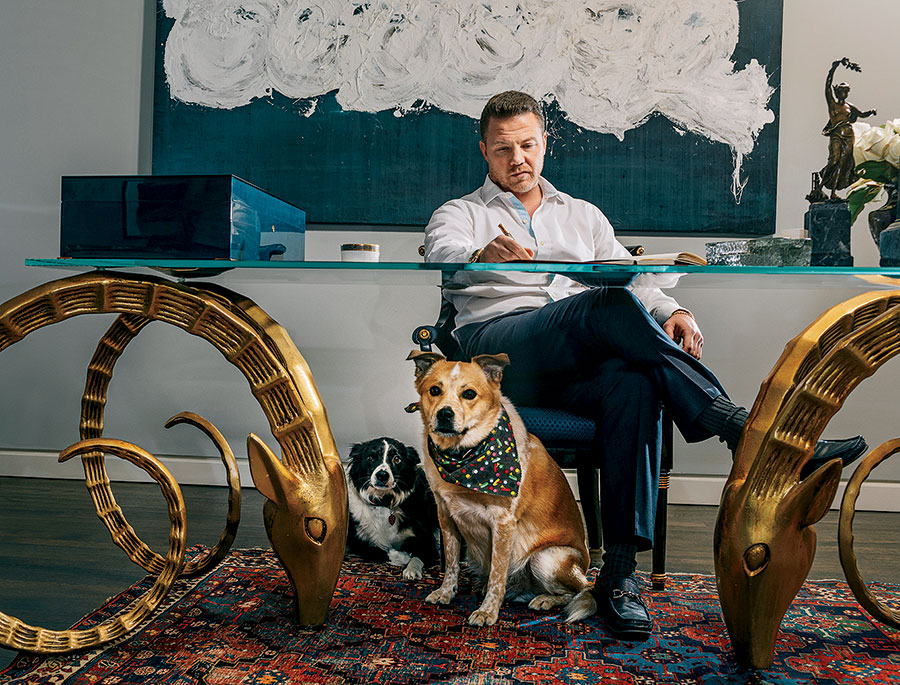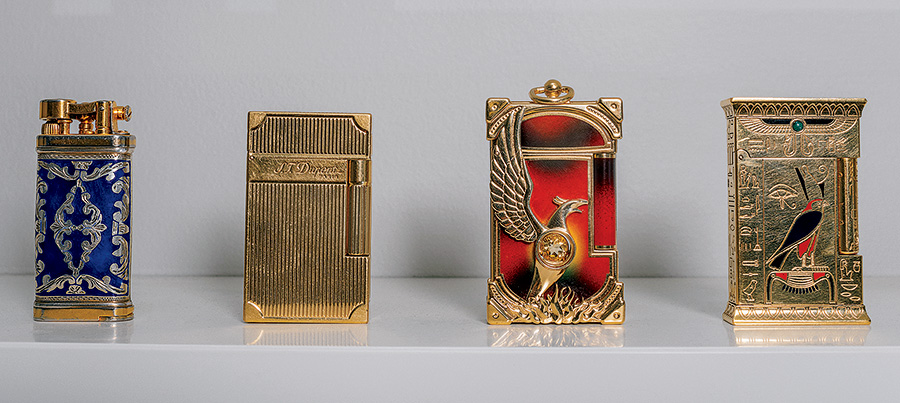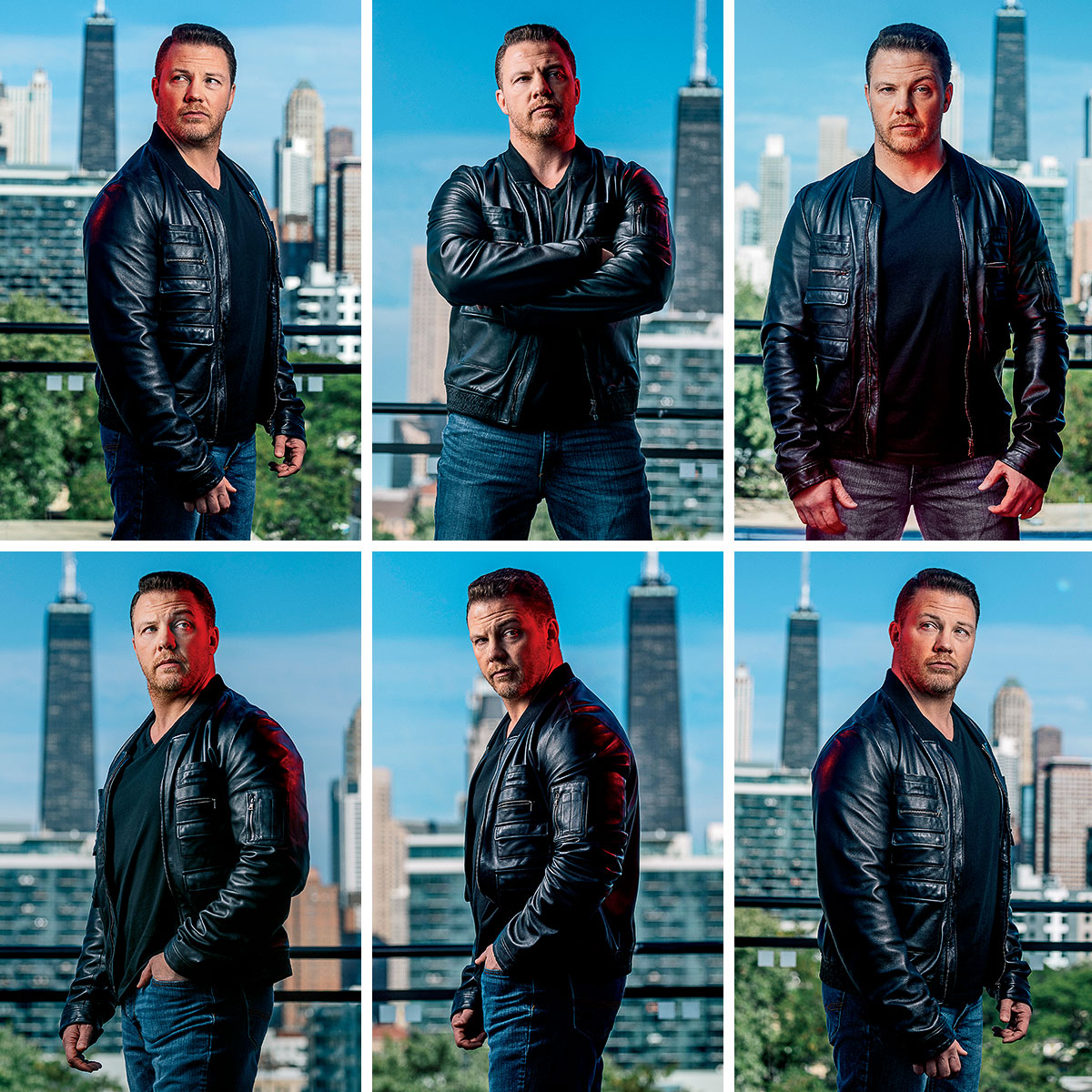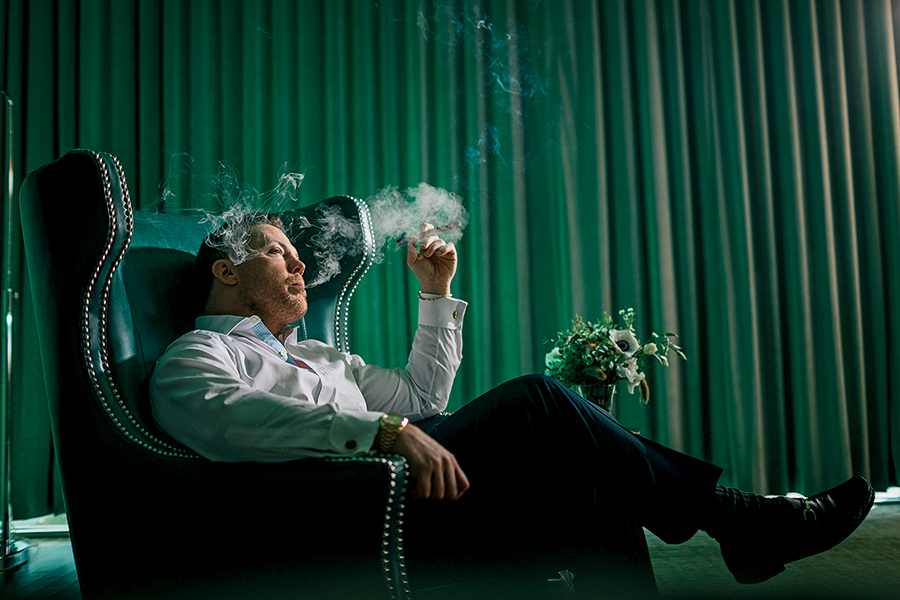There was a time in my early 20s when I frequently found myself enamored of a certain kind of man. The kind of man I’m talking about was not old, but he was older than I was. He was not smart necessarily, but he seemed to have found a way to harness what intelligence he had toward worldly ends. He was generally high achieving, charismatic, and accomplished in a chosen field that earned him a comfortable living and substantial degree of respect.
This time in my life — of being easily enchanted by powerful men — ended long ago, and yet every now and then I end up revisiting it, wondering what it is that gives these men their power. One such occasion was a cool morning in June, when I found myself riding in the passenger seat of a quarter-million-dollar sports car alongside a man named Joseph Siprut. It was Father’s Day, and as we careened onto Lake Shore Drive, I couldn’t help but remember the joy of riding beside my own father, also a sports car enthusiast — the carefree, joyful, slightly infantilizing exhilaration of keeping a man company as he ushers you in high style down an open highway.
Advertisement
To call Siprut’s Aston Martin Rapide S a sports car now strikes me as an understatement. From the passenger seat, it felt more like a rocket or a bobsled. I’ve grown accustomed to the height of a minivan, and the always impressive Chicago skyline appeared even more imposing from this low-slung vantage point. Indeed, I felt so close to the road, I marveled at the fact that the vehicle wasn’t scraping the asphalt and catching on fire.
An Aston Martin, in case you need reminding, is the sports car driven by James Bond. Joseph Siprut is not an intelligence officer in MI6, but he is a lot of other things: the managing partner of one of the country’s top-ranked class-action law firms, a successful film actor, a competitive wrestler, and a multimillion-dollar hedge fund manager, to name a few. By the time he took me for a drive, I’d come to think of him, this chiseled, boyish, almost pathologically polite 41-year-old playboy, as Chicago’s Jay Gatsby. Like Fitzgerald’s character, he seemed to inhabit a gilded world most of us can only gaze at from the outside. He emanated an aura not just of wealth and success and charisma, but of overflowing goodwill. As I rode beside him, I imagined that in a world he created, there’d be an Aston Martin for everyone.
“So,” I asked him that morning, “why this car? Does it handle better than other sports cars?”
“Nah,” he said. “I just like what I like.” This assertion seemed to be one of Siprut’s guiding principles, and also the essence of what gave him his sheen. It wasn’t the car itself, or the sleek duplex condominium, with its roof deck and custom wrestling ring, or the bespoke suits or the collection of Cuban cigars or the designer cufflinks. These beautiful things were the byproduct of his aspiration but not the engine. What drove him, rather, was his palpable belief that he deserved these things — the best things — and that he should enjoy them fully, because life was meant to be enjoyed, obstacles were meant to be surmounted, doubts stifled, haters ignored.
“Do you think you’re a narcissistic sociopath?” I’d asked Siprut during one of our first conversations, back in May. I posed the question in jest, and Siprut didn’t seem to mind.
“I don’t think so,” he said with a stiff laugh. “Though you might want to ask my ex-wife.”
I hadn’t been trying to pick a fight. It’s just that Siprut struck me as a man who liked to spar, and it seemed only sporting to offer him the chance.

The first time I visited Siprut at his home, which occupies an ordinary-looking modern building at the sleepy edge of the Near North Side, I was accompanied by my 12-year-old son, whom Siprut had offered to teach to wrestle. Wrestling is a hobby of his, but like all of his hobbies, he treats it with the seriousness of a vocation. He’s competed in USA Wrestling’s U.S. Open in Las Vegas the past two years, and he took second place in his age group for Greco-Roman wrestling last year. He’s had a training ring built on one of the unoccupied floors of his building and often invites fellow wrestlers to train there, many of them world-class competitors, including a few collegiate All-Americans and Olympic gold medalists. Today he brought his own 10-year-old son (his 13-year-old daughter was busy studying for a test), and for about an hour, I watched as he patiently and playfully showed the boys some basic moves.
“Now, Roscoe,” he said to my son, “you’re a strong guy, so this is gonna be easy for you, but let’s start with the basics.” He demonstrated to my son, who was tentative at first, how to lean into a hold, how to stay balanced, how to use different strategies to set an opponent off-guard. He did most of this by letting my kid pummel him.
“I like Joe,” my son said as we left that evening. How could I blame him? A chameleon, Siprut seems to take on the characteristics of those in his midst, and so around boys, he’s a boy, with a boy’s unselfconscious exuberance.
It was a stark transition, then, when I visited his condo proper a few weeks later. It felt about as child friendly as a high-end art gallery. Siprut’s condo elevates the bachelor pad to an art form. He moved into the space after he and his wife, a singer, separated in 2013. He’d met her when he was in his early 20s and attending law school at Northwestern. They were married in 2006, moved into a small apartment in Lake View, and had a daughter and a son. His wife stayed home with the children as she pursued her singing career, while Siprut built his reputation as a corporate attorney. Soon he had the trappings of success — money, professional respect, a beautiful family — “but after a while,” he said, “things just weren’t working.” He describes the process of separating as a painful but necessary transition in his ongoing personal metamorphosis. “I always say there are only two things no one has ever regretted: going to the gym and getting divorced.”
This seemed a dubious generalization, but he pronounced it with such confidence that I found myself nodding. Today his kids spend most weeks with their mother, who lives in Andersonville, and most weekends at the condo. The kids’ bedrooms are the only visible concession to family life that I could find during our tour of his home.
The visit began with Siprut showing me his various collections. These include an array of fine cigars, one of which had been given to him as a gift and is shaped like a penis — I mean, even more like a penis than a regular cigar — as well as a set of swords, a series of aerial photographs he’d taken from helicopters, and an assortment of high-end cocktail accessories.
When he offered to make me an old-fashioned, I was expecting the top-shelf whiskey and fancy glassware. What I wasn’t expecting was for him to pull out a cedar plank and a stainless steel butane torch. For a moment my stomach lurched. Did these belong to a sex dungeon concealed inside the walk-in closet? No, it was only that if you’re going to make an old-fashioned, you might as well accent it with a bit of cedar smoke.
He continued to show me around the apartment as we sipped our cocktails, and I was struck by how beautiful and cold it all felt. His desk was topped with glass that looked like crystal and stood on bronze legs shaped like ram’s heads. The countertops were marble. Unlike in my home, where flotsam litters every surface, there was not a single object in his home that wasn’t placed deliberately to highlight one of his interests: a dinosaur tooth, a vast collection of Italian loafers, tidy bookshelves containing selected Ayn Rand titles that Siprut insisted he’d only read during his “Rand phase” in college.
The tour ended, as well it should have, with a rooftop view of the city. He apologized for the dust, as he was in the midst of converting the area into what he assured me would be a top-notch spot for entertaining.
“I remember reading in one of your essays something about your wanting to throw an orgy one day,” he said. “Don’t you think this would be a beautiful spot for an orgy?”
“Sure,” I deadpanned, suspecting he was somehow trying to bait me, “only the summer is so short in Chicago.”
Undeterred, he added, “It’s going to have everything you could want on a roof. Except a hot tub.” He said he got approval from the city, but getting a tub up to the roof was too big of a hassle.
“Well, don’t expect me to come back if you don’t even have a hot tub,” I said.
Settled into the folding chairs we’d brought up and swirling our drinks, we took in the view of the skyline, unimpeded and dazzling in the dusky light. Below I could see a dozen barracks-like structures, mostly boarded up, some with rundown cars in front — the last remnants of the Cabrini-Green housing project.
“Personally, I’d rather they be left as is,” Siprut said. Once the buildings were bulldozed, he explained, everything would be developed, adding to the endless vertical expansion of the neighborhood. But as long as the urban blight stuck around, nothing would obscure his view.

I’ve always agreed with the axiom that Chicago is the most American of cities. I’m not referring to the patriotism of its inhabitants, the corruption of its politicians, its long history of segregation, or its hot dogs. I’m not even referring to its wide, car-friendly streets or the Midwestern wholesomeness of its culture. What I’m referring to is its relationship to worldly ambition. Chicago is the capital of unfettered aspiration, a place where people come to do business with a brasher, more provincial coarseness than in the city’s coastal counterparts. Chicago is an international city that still speaks in the vernacular of the hardworking northern European immigrants who flocked to its factories more than a century ago. It’s a place where the pursuit of power and lucre seldom comes cloaked in an aura of cosmopolitan style.
Advertisement
This was one of the things Siprut seemed to like least about the city — its provincialism. “The people here are in many ways very friendly and have good spirits,” he told me at one point, “but I get disappointed by people. I think anytime that you have somewhat of a profile, you’re going to attract criticism, judgment, bad energy.” And yet, when he first arrived in the city after growing up in Mount Prospect, which he describes as the most boring place on earth, and attending college at Marquette University in Milwaukee, he felt as though he’d arrived at the beginning of his life.
He was describing these early impressions to me during a conversation at the Clayton, a cigar club in the Fulton River District. I’m not a cigar smoker, and I asked if perhaps I could enjoy a Newport 100 while he puffed on his Cuban. Siprut laughed and said he was pretty sure cigarettes were not allowed. I declined the cigar he proffered, content to watch him attend to his. After snipping off the tip with a shiny, guillotine-like device, he used a fancy silver-plated Dupont to light up.
Siprut started his first job in the city in 2003, at the boutique litigation firm Novack and Macey. He spent the next decade mostly defending corporations. He enjoyed his success, but felt like something was missing, like he was a well-paid cog in someone else’s machine. “I started to ask myself what kind of legal practice I’d like to have, what kind of law most interested me.”
The answer led him to a brand of plaintiff-side class-action law he describes as high-risk, high-reward cases with a clear David and Goliath dynamic. He started his own firm, Siprut PC, in 2011. “I’ve sued all the airlines,” he told me. “I’ve sued the NCAA over their return-to-play guidelines on behalf of players who have suffered head injuries.” He secured a $75 million settlement in the NCAA case. In 2013, he successfully sued the maker of Banana Boat, to the tune of $200 million, after reports came to light that its UltraMist spray-on products were flammable in their liquid form, even after application, a fact the manufacturers had failed to disclose.
Siprut’s firm made the National Law Journal’s list of the country’s leading plaintiff law firms in 2016. Two years earlier, the Chicago Daily Law Bulletin had named Siprut one of Illinois’s 40 top attorneys under 40. In its profile of him, the Bulletin quoted a defense attorney who’d gone up against Siprut in court: “Joe is simply fearless.” A business litigator, interviewed for the same article, added: “Joe is the kind of lawyer who brings a gun to a knife fight.”
Among his highest-profile cases was the one he filed against Southwest Airlines in 2011. His client had tried to use a drink voucher from a previous flight, and the flight attendant practically tore it out of his hand and informed him that the airline wasn’t honoring them anymore. “The Southwest case got a lot of press,” Siprut told me, “because it represents everything class action is for, and it also represents what a lot of people think is wrong with it — what I think they misunderstand about the practice.”
He explained how, at the time, Southwest had a program where passengers who purchased premium tickets got drink vouchers. There was no expiration date on the vouchers, and they ostensibly had monetary value — until one day Southwest decided they didn’t.
“On the surface,” Siprut told me, “it just seems like a guy being denied his free drink, but really, it’s a nationwide, systemic scheme. Sure enough, there’s a memo out there calculating how much money they’re going to save by doing this, something like $50 million.” In the end, the case was settled for $30 million.
Last year the Cook County Record, a legal journal, reported that a U.S. district court judge excoriated Siprut for requesting “excessive” fees after he secured a settlement against Western Union for issuing unsolicited text messages. Siprut wouldn’t comment when I asked him about the upbraiding, though he is well aware of the criticism class-action cases provoke from people who like to say it’s “scumbags” like him who are getting rich by encumbering the free market with frivolous lawsuits. Siprut argues that if you actually understand what class action is, you see why that’s a mischaracterization of the process. “Let’s say a bank has 10 million customers across the country and takes $1 out of everyone’s account. Most people aren’t going to notice it. Even if a few do and call to complain, it will end there. No one who lost $1 is going to hire a lawyer. The purpose of the class-action mechanism is to pool the interest of people who, on their own, wouldn’t be incentivized to lawyer up and sue. A wrong has occurred, and there has to be a remedy for it. Otherwise, they can do whatever they want.”
In general, Siprut’s logic made sense. And yet I questioned how effective this legal check on corporate greed could be in the long term. Wouldn’t stricter regulation be a better way to repair a broken system? Or nationalization of private industry? Or a proletarian mob with pitchforks? I asked Siprut how much good he really felt he was doing in the world. He shifted in his armchair and formed his lips into something close to a smile. “If there’s a prospect for a class-action lawsuit, you tend to see better corporate behavior on balance, but I don’t have any delusions of trying to cure the human condition.”
I surmised that there was a certain willful ignorance at play here. Siprut had told me that he’d given up reading much of the local daily news several years ago, and he doesn’t use social media. He describes those decisions as part of his regimen of self-care. “My plan is to live to 120,” he told me. “I take dozens of pills a day. Functional medicine stuff. Making sure everything is optimized.”
“Good for you,” I responded. “I think I’ll be lucky if I make it to 50. I’m the only person I know who took up smoking at 39. I eat bacon all the time.”
“You’re just going for it,” he said.
“Exactly.”

Trying to stay on topic, I asked, “How do you not worry all the time about, you know, climate change, income inequality, fascism, white supremacy, the end of the world, and so on?”
Siprut drew deeply on his cigar and blew out a cloud of smoke. He seemed to be genuinely considering the question. “Part of what I’m realizing as I get older is that I might not be able to solve the world’s problems or all the city’s problems, and I might not even be able to solve all my own problems. But what I can do is focus on a few of them and make a huge difference. For example, I’m a huge supporter of PAWS. I love animals. I give PAWS a lot of money. My dogs are from there. I like to support them.”
This, I’d later learn, was one of his few soft spots. He might be a shark in the courtroom, a killer with the ladies, an animal in the wrestling ring, but watching the dog-killing scene in HBO’s Chernobyl, Siprut had to close his eyes and have a friend tell him when it was over.
“PAWS,” I wrote in my notepad, then glanced at the cigar he’d offered me earlier. I picked it up. “So how do I smoke this?”
After a few weeks of getting to know him, I realized that Siprut, like those powerful men I used to fall for, was good at nearly everything he did, and that he didn’t want to do a thing if he couldn’t be good at it.
In a way, this was what led him to the movies, first as a producer and then as an actor. By the time he got involved in films, in 2016, he’d already invested in a number of non-law-related enterprises, including the downtown sushi restaurant Katana and a River North nightclub, all because, as he put it to me, “I wanted to have a place where I could roll up and have some quality control. Then, in that spirit of random things, I thought I should find a movie I could get involved with just for fun.”
Not long afterward, a project came to his attention called 7 Days to Vegas, a comedy about a group of high-stakes Hollywood gamblers. “I was an investor, but I wanted to see how the sausage was made.” What he saw looked like a lot of fun. “I thought that I could probably act better than these people. Of course, it’s much harder than it looks. I knew they were casting a role, so I was just like, ‘Let me audition. Don’t even tell the director what’s going on, just let me audition.’ So I auditioned and the director wanted me.” He got a supporting role as a cigar-smoking card shark. In his living room one night, he showed me a clip. I had to admit, I wouldn’t have been able to tell him apart from the film’s professional actors who’d come to Hollywood more directly.
That first foray into acting may have been just for fun, but even as his legal career continued apace, his new hobby quickly became more serious. “I studied the craft. I read a lot of books, worked with a coach, videotaped myself, and sent it to people to critique.” Within a few months of making the first movie, he got a call about another opportunity, a film with Matthew Broderick. The producer asked him for a tape, and the next thing he knew, he was cast in To Dust, in which he plays an undertaker to a bereaved Orthodox Jew, played by Broderick. Unlike 7 Days to Vegas, this film, which became a favorite on the festival circuit, seemed like one I might actually watch. Maybe not at the theater, but certainly on a plane or in my pajamas.
“After that, every role has gotten bigger and every project has gotten bigger. The last one I did was a $10 million movie starring Kurt Russell. And I played the main bad guy. I played a murderous Russian gangster.” He cued up a few scenes of violent mayhem from the movie, called Crypto, which was not widely released in theaters in the States. In the final one, his head gets blown off.
“That seemed very realistic,” I said.
“Yeah, it actually takes a lot of practice to fall the right way.”

The more clips we watched, the more excited Siprut got. “I’ve now been in six movies. And my opportunities are increasing exponentially. I also have the freedom and luxury to only say yes to the things I want to do. I don’t have to be some 23-year-old kid in L.A. waiting tables and working as an extra while he waits for his big break. That’s a miserable existence. I mean, God bless those people, but that’s why I went to law school.”
Yes, I thought, God bless those starry-eyed, starving artists living in their illegally zoned warehouses–turned–communal living spaces and dreaming of the day they’ll see their name in lights and maybe even pay off some debt or purchase a few months of Obamacare. How adorable they are. And how foolish.
I looked carefully at Siprut to see if he recognized the acid-tinged mirth that certainly must have been discernible in my expression. I wanted him to recognize it, to say something self-deprecating or at least self-aware, because, you see, I kind of liked Joe Siprut. I was not enamored of him, but I felt a certain fondness. And so I was self-conscious for him, though he seemed to have no self-consciousness himself.
Advertisement
He looked at me warmly, and I realized at that moment that it never would have occurred to him that I might be one of those people living “a miserable existence,” a writer hustling gigs at the age of 41 and doing bike delivery for Uber Eats to make ends meet. It didn’t occur to him because those people were elsewhere and I was with him. He was golden, and so anyone he touched was golden, too, and the goldenness reflected back in a blinding aura of goldenness. How easy it was to fall under the spell of his gaze, the gaze Fitzgerald got just right when The Great Gatsby’s narrator, Nick, meets Gatsby for the first time: “It was one of those rare smiles with a quality of eternal reassurance in it. … It understood you just so far as you wanted to be understood, believed in you as you would like to believe in yourself, and assured you that it had precisely the impression of you that, at your best, you hoped to convey.”
I took a sip of my drink. “So what is Matthew Broderick like?” I felt for a second as if I, too, were only the slightest degree of separation from fabulous actors and their fabulous lives.
“Oh, he’s a great guy. The nicest guy.”
“Of course he is. He seems so nice.”
Siprut tapped the remote to cue up the next clip. “Now this is where I murder an old lady.”
There he was again onscreen. My eyelids were growing heavy, but I stayed for a while longer, sitting on the pristine sofa, clinking the ice in my drink, watching Siprut watch himself.

I thought that might be the last time I’d see Joseph Siprut, but not long after, he asked me to meet some of his friends, as well as the woman he’d been dating for the past six months, for an evening of karaoke. He’d never mentioned this woman before, and I realized that, somehow, given his bachelor pad, his cigars, his obsession with physical fitness and beautiful objects, I’d simply assumed he was unattached. He’d told me that since his divorce he no longer believed in marriage, and we’d agreed that in a more rational world, lifelong unions would be replaced by five-year renewable contracts. I was eager, then, to talk to the woman who had, at least for the time being, captured his heart.
From the street I could see that the downtown karaoke bar was crowded with tipsy young professionals blowing off steam. Siprut had reserved a room, opened a tab, and invited a few friends to join him. Most of these friends, he told me, didn’t know one another. He introduced me to his girlfriend, whose name was Kathy, and went to fetch our drinks. A professional-looking brunette in her 30s, Kathy defied the image I’d conjured of a needle-thin European model in stilettos. She seemed more like an actual person you’d see around town, albeit a particularly well-dressed, well-coifed version.
She told me that she and Siprut were introduced by their personal trainer, who considered them two of the most over-the-top people he’d ever met. Kathy had invited Siprut to her annual Russia-themed party, which featured a Champagne tower and imperial-era costumes. She and Joe got on well together, she suspected, because they were so similar. They both knew how to work hard and “white-knuckle it” through stressful periods. They also both loved and owned many of the same things. They were stubborn when it came to doing things their own way.
“For example?” I asked.
“For example, we both love sports cars, and we both refuse to put the front plate and city sticker on ours because we think it ruins the aesthetic. We’d rather eat the tickets.”
When I asked her if she had any sense of how Siprut’s over-the-top style came to be, Kathy’s answer surprised me: “He’s told me that he doesn’t really know how to be in a relationship, that he’s terrified of feeling, that he often doesn’t feel like he belongs to any group. I think he needs maximum love and appreciation and kindness. I think he needs to be showered in love. That’s why, until me, he tended to date artists, performers, much younger women who needed something from him. I think I’m the first woman he’s ever dated who’s had a real job.”
“It sounds like he’s growing,” I offered. “Is he in therapy?”
“No,” she said. “He would require a very patient therapist.”
“Well, he’s not alone,” I said.
Kathy laughed, and as I watched her, I thought then about my younger self — the striving, yearning, fearful woman who wanted to be somebody, to feel special, to know what it’s like to buy everyone a round, to give money to pet causes, to hop onstage and start crooning karaoke while everyone else patiently, drunkenly, waits in line.



